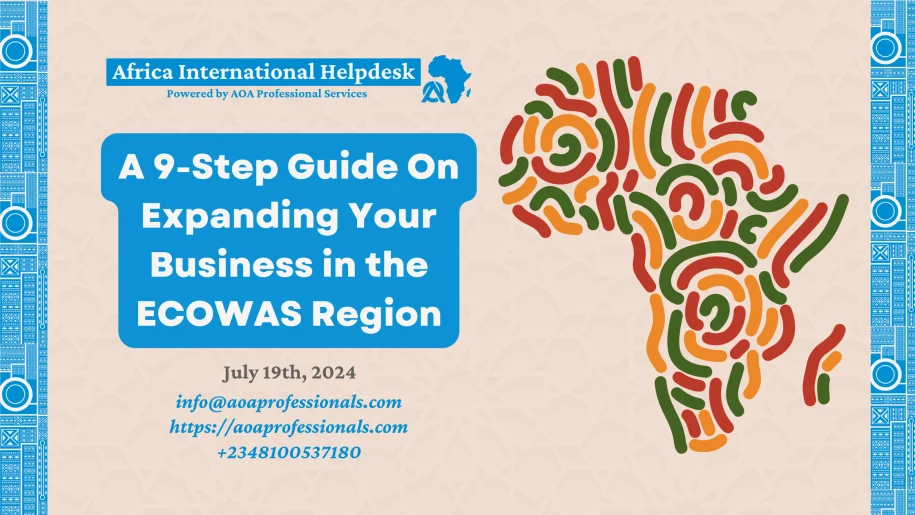Introduction
Expanding your business into the Economic Community of West African States (ECOWAS) region offers a significant opportunity for growth. This article provides a detailed roadmap to help businesses navigate the complexities of entering and thriving in this diverse market.
Understanding ECOWAS
What is ECOWAS?
The Economic Community of West African States (ECOWAS) is a regional political and economic union of fifteen countries located in West Africa. Established on May 28, 1975, with the signing of the Treaty of Lagos, ECOWAS aims to promote economic integration and cooperation among its member states to foster development and stability in the region.
Member Countries:
- Benin
- Burkina Faso
- Cape Verde
- Côte d’Ivoire
- Gambia
- Ghana
- Guinea
- Guinea-Bissau
- Liberia
- Mali
- Niger
- Nigeria
- Senegal
- Sierra Leone
- Togo
Key Objectives of ECOWAS:
- Economic Integration: To achieve collective self-sufficiency for member states by creating a single large trading bloc.
- Trade Liberalization: To eliminate trade barriers and enhance free trade among member countries.
- Monetary Cooperation: To harmonize monetary policies and eventually establish a single currency.
- Infrastructure Development: To develop and improve regional infrastructure, including transportation, energy, and telecommunications.
- Peace and Security: To ensure peace and stability in the region through political cooperation and conflict resolution mechanisms.
Steps to Expand Your Business in ECOWAS
1. Conduct Market Research
- Identify Market Demand: Assess the demand for your products or services in different ECOWAS countries.
- Analyze Competitors: Study the competition to understand market dynamics and identify your competitive advantage.
- Cultural Insights: Gain insights into the cultural preferences and consumer behavior in each target market.
2. Regulatory and Compliance Requirements
- Business Registration: Ensure your business complies with the registration requirements in each country.
- Tax Regulations: Familiarize yourself with local tax laws, obligations, and potential incentives for foreign businesses.
- Trade Agreements: Utilize ECOWAS trade agreements that facilitate reduced tariffs and smoother cross-border trade.
3. Develop a Strategic Business Plan
- Market Entry Strategy: Decide on the best entry mode—whether direct exports, partnerships, joint ventures, or subsidiaries.
- Localization Strategy: Tailor your products, marketing, and customer service to meet local preferences and norms.
- Risk Management: Identify potential risks and develop strategies to mitigate them, including political, economic, and legal risks.
4. Build Partnerships and Networks
- Local Partnerships: Form alliances with local businesses to gain market insights and establish credibility.
- Business Networks: Join business associations and chambers of commerce to expand your network and access support.
- Government Relations: Engage with local government agencies to understand regulations and access business support programs.
5. Financial Planning and Funding
- Budgeting: Create a detailed budget covering operational costs, marketing, and contingencies.
- Funding Options: Explore local and international funding options, including banks, investors, and ECOWAS development funds.
- Financial Management: Implement robust financial management practices to monitor and control expenses.
6. Marketing and Sales Strategies
- Market Research: Conduct thorough research to understand consumer preferences and purchasing behaviors.
- Digital Marketing: Utilize digital platforms to reach a broader audience and drive engagement.
- Sales Channels: Develop diverse sales channels, including online platforms, retail outlets, and distribution networks.
7. Operational Excellence
- Supply Chain Management: Establish a reliable supply chain to ensure timely delivery and product availability.
- Quality Control: Maintain high-quality standards to build trust and brand loyalty among consumers.
- Customer Service: Provide exceptional customer service to enhance satisfaction and foster long-term relationships.
8. Training and Development
- Local Talent: Hire and train local employees to leverage their market knowledge and expertise.
- Continuous Learning: Invest in ongoing training and development programs to keep your team updated and skilled.
9. Monitoring and Evaluation
- Performance Metrics: Establish key performance indicators (KPIs) to measure success and track progress.
- Regular Reviews: Conduct regular reviews to assess performance and make necessary adjustments.
- Feedback Mechanism: Implement a feedback system to gather insights from customers and stakeholders for continuous improvement.
Case Studies
Example 1: Nigerian Company in Ghana
A Nigerian consumer goods company successfully expanded into Ghana by forming strategic partnerships with local retailers. They adapted their product packaging to suit local tastes and preferences, which significantly boosted their market penetration.
Example 2: Togolese Firm in Côte d’Ivoire
A Togolese technology firm entered the Ivorian market through a joint venture, leveraging local expertise to navigate regulatory challenges. Their collaborative approach facilitated a smoother market entry and rapid growth.
Conclusion
Expanding your business in the ECOWAS region requires careful planning, a deep understanding of local markets, and strategic execution. By following these steps and learning from successful case studies, businesses can tap into the vast opportunities offered by this dynamic and growing region. With the right approach, your business can thrive and contribute to the economic development of West Africa.


Leave a Reply